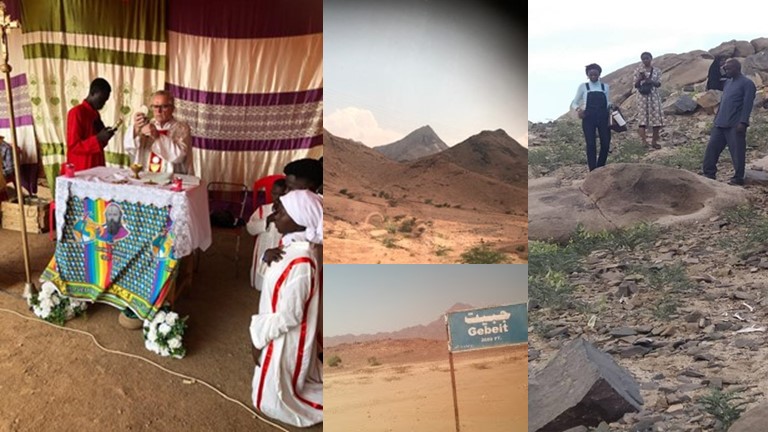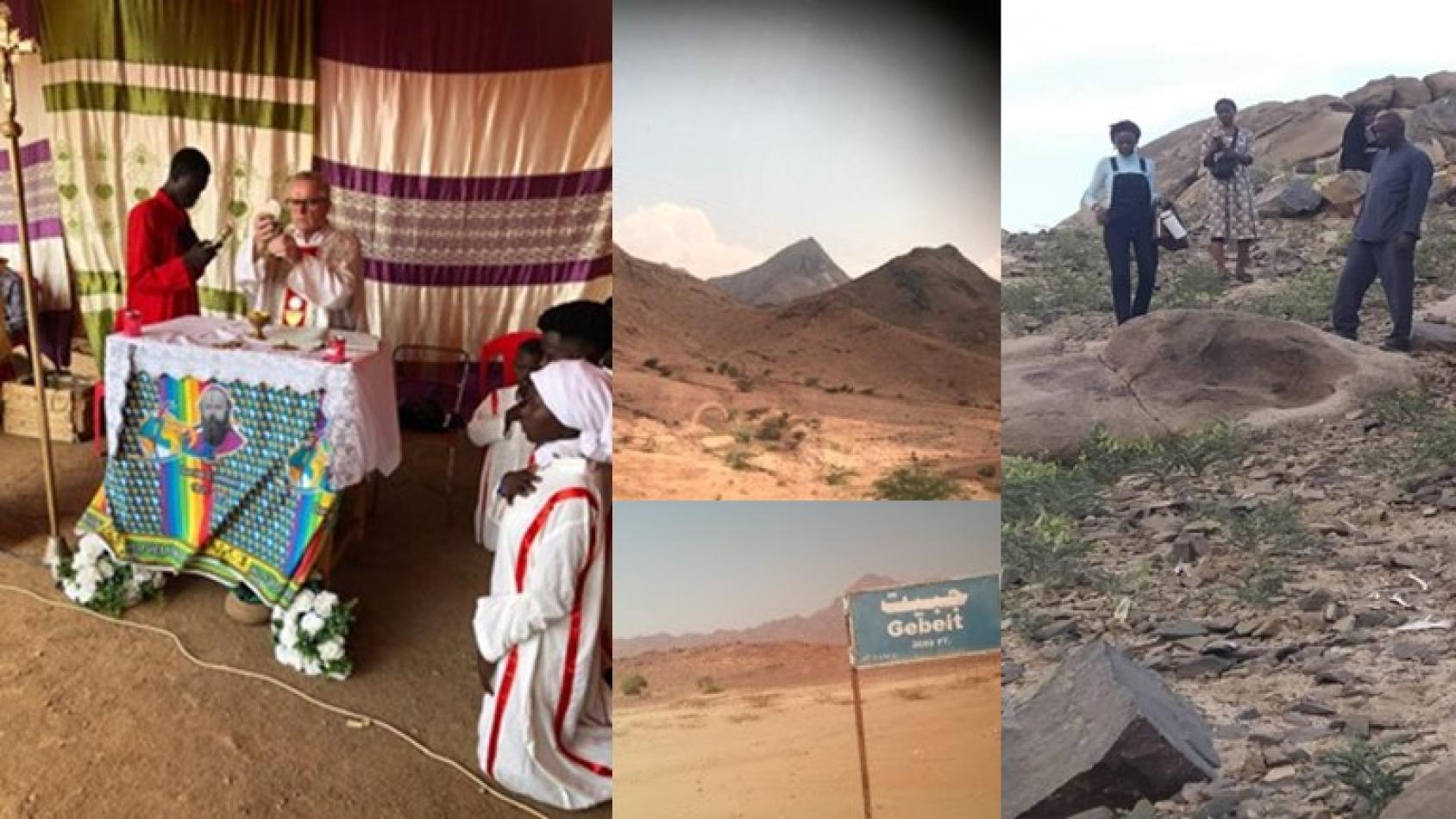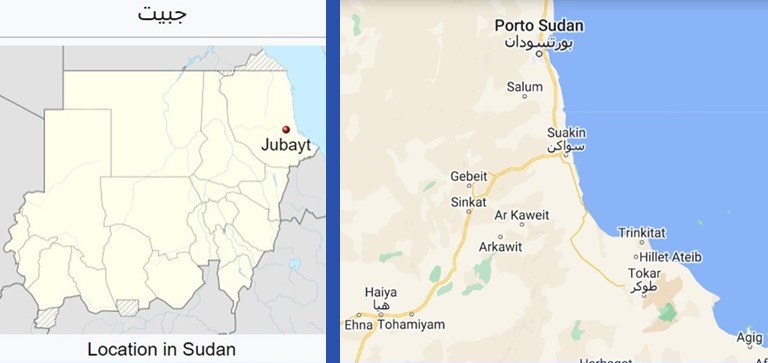Daniel Comboni
Comboni Missionaries
Institutional area
Other links
Newsletter
Saturday, October 19, 2024
Father Norberto Stonfer, a Comboni missionary, is currently working in Port Sudan, Sudan. This year, despite the dangers of war, he decided to leave the city and travel to Gebeit, some 120 km away, to go and celebrate the solemn mass on the dies natalis (10th October) of St Daniel Comboni, to encourage the local “little flock to remain faithful to the Shepherd”, says the missionary, and to thank the catechist “for having kept this embryo of a Church alive for so many years.” And he adds: “When you embark on an adventure of this kind, where you really feel like a missionary and in the footsteps of the Founder, you are willing to do anything.”
Solemn Mass for the dies natalis of St Daniel Comboni
in the Catholic community of Gebeit

from where Father Norberto Stonfer (left) celebrated Mass.
Gebeit (Arabic: جبيت) is a small provincial capital of Eastern Sudan, on the Port Sudan-Atbara-Khartoum railway line, once one of the most important in the country, but now out of service. When you arrive in Gebeit, however, you cannot help but admire the beauty of the railway station building, in perfect English colonial style.
Gebeit is one of the centres of the parish of Port Sudan, from which it is about 120 km away. It is located about sixty kilometres from Suwakin, the first port of Anglo-Egyptian Sudan, which was also the first Comboni pied-à-terre on the Red Sea back in1887.
Recently, Gebeit has come into the limelight for a very worrying news story: the assassination attempt that endangered the life of Sudan’s army chief General and President.[1] That it is even now a strategic post of extreme importance is clear from the numerous checkpoints one encounters along the road as one approaches the town, but especially from the presence of several barracks, both army and police.
Before the separation of South Sudan in 2011, there were many soldiers here from the southern regions, mostly Catholics, which explains the presence of a Catholic community in this remote place today and the religious assistance provided to it.
The small Catholic community in Gebeit – today composed of some 20 families – is ‘dedicated’ (or rather, ‘entrusted’) to St Daniel Comboni. And the reason is easily said: almost certainly Bishop Daniele Comboni passed through here in 1880, during his last journey back to Sudan.[2] Having left by ship from Naples, he had passed through the Suez Canal and disembarked in Suwakin, before reaching Khartoum.
A Domestic Church
When I arrived in Gebeit, the first thing I did was to ask the catechist Tarcisio if there was any land belonging to the Catholic Church. His answer: “No! Our Church has no property in this town.” The only space available for a meeting is his home, which also serves as an evening school. The last liturgical celebration the community attended took place during Lent 2023, shortly before the outbreak of this absurd and bloody war (15th April 2023).
Thus, our ‘solemn mass’ was celebrated in the ‘Piazza Grande’, i.e. under a tent erected in the courtyard (hosh) of the catechist’s house, large enough to provide shade for everyone. The group that came with me from Port Sudan in two coaches consisted of 75 people, including choristers, altar boys, members of the Legio Mariae and others who had joined in. Many local Catholics were also present. Many curious onlookers, especially women, spied us from behind the wall of the zeriba (enclosure), fascinated by the songs performed by our choir, rhythmic on drums and accompanied by the sound of a pianola: a novelty for both Christians and Muslims. Many songs were sung, all joyful and inviting to dance, composed by Card. Gabriel Zubeir Wako and his team on the occasion of the beatification (1996) and canonisation (2003) of Daniel Comboni, all centred on the figure of the great ‘Apostle of Nigrizia’.
Apart from the adventures of the journey, both outward and return, it was a wonderful experience. Just getting out of the ‘enclave’ of Port Sudan was a great relief for me, but also for the parishioners, who since the outbreak of war – now a year and a half ago – have been trapped in this port depression on the shores of the Red Sea.
When you embark on such an adventure, where you really feel like a missionary and in the footsteps of the Founder, “you are willing to do anything”.[3] So, you do not care that you left two hours or more late from Port Sudan and had to stop at countless checkpoints for tedious controls. Just before arriving in Suwakin, the policemen and security officers kept us stopped for over half an hour and wanted to see and take pictures with a mobile phone of all the necessary permits issued by the police, the Ministry of Interior and the Ministry of Religious Affairs, and other documents. And all this... to remind us that we are in a country at war! We lost another good hour due to a mechanical problem: the engine’s drive belt had come loose and the battery had completely discharged.
We encountered the same problems on the return journey. With an ‘extra’ that tested our nerves: between Gebeit and Suwakin, we were stuck for an hour, at night, on the side of a roadway frequented only by large, powerful trucks travelling at great speed and making you wince as they passed. It was the last ‘test’ of the day. However, in the end, all went well... with the intercession of St Daniel Comboni.
‘At the ends of the earth’
Leaving Port Sudan in the morning, we arrived in Gebeit after 2pm. My first impression was: “But have I really arrived, as Luke put it, ‘at the ends of the earth’ (Acts 1:8).” Then, after perusing the guidebook I had taken with me and reading a few pages in which the history of this place is told, and now finding myself on the spot in person, I had to change my mind. Some – indeed, many – had arrived before us in these mountains, and not in the recent past, but 1,500 years before Christ. To do what? To prospect for gold![4]
The rush for the precious metal in these mountains of northern Sudan, close to Egypt, has never stopped since the time of the pharaohs. On the contrary, in recent years there has been a great increase. And ‘history’ lights up: hoarding the riches of this great country is the main cause of the ongoing war, wanted and financed by the rich Gulf countries. It is indeed true that those who have a lot always want to have more!
But a Comboni missionary like me, a ‘son’ of Comboni, who, following the example of the Founder, looks to this country “in the pure light of faith,” the real gold of this land is made up of so many brothers and sisters “belonging to the same family.”[5] And so, in my homily I encouraged this ‘little flock’ to remain faithful to the Shepherd, and I also sincerely thanked catechist Tarcisio for having kept this embryo of a Church alive for so many years. Then I invited them all to prepare their children, both big and small, for baptism and first communion, “because that is how the Church grows.”[6] And who knows, perhaps by Christmas we might return to this outpost of the parish for the administration of the sacraments of Christian initiation!
After the celebration of the Mass, Tarcisio said a few words to me that I will never forget. First, he thanked me for the visit, then he added: “Tonight we will sleep peacefully, because you have brought us Jesus.”
Father Norberto Stonfer, mccj
Port Sudan, 17° ottobre 2024
[1] Abdel Fattah al-Burhan, General-in-Chief of the Sudanese Army, survived an assassination attempt with a drone during a military graduation ceremony. Five people, including students and an officer, were killed. Gebeit has become the temporary capital of the Sudanese government and home to many government ministries and foreign embassies since the war that devastated the capital Khartoum began in April 2023.
[2] On 27th November 1880, from Naples, with his usual determination, Mgr Comboni set sail for his eighth and final voyage to Africa, alongside his missionaries, determined to continue the fight against the scourge of slavery and to consolidate missionary activity with the Africans themselves.
[3] “The Missionary must be prepared for everything: for joy and sadness, for life and death, for embrace and abandonment, and I am ready for it all” (Writings, 218). “A Missionary’s life is a combination of grief and enjoyment, exhaustion and hope, suffering and consolation” (Writings, 313).
[4] The extraction of gold from quartz veins in the area dates back to the period of the New Kingdom of Egypt, i.e., the height of Egyptian influence.
[5] “The Catholic, who is used to judging things in a supernatural light, looked upon Africa not through the pitiable lens of human interest, but in the pure light of faith; there he saw an infinite multitude of brothers who belonged to the same family as himself with one common Father in heaven” (Writings, 2742).
[6]Here is how the Collect of the Mass of St Daniel Comboni reads: “God, Father of all nations, who through the apostolic zeal of the holy bishop Daniel extended your Church among the peoples of Africa, grant her, through his intercession, to grow in faith and holiness, and to be enriched always with new children, to the glory of your name.”





